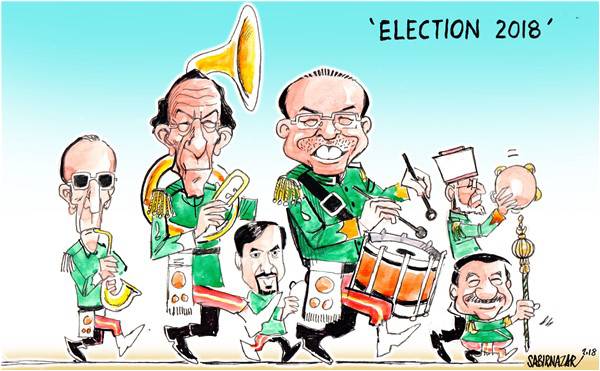
Colonial bureaucracy
Madam,
Referring to the bureaucracy in his August 11, 1947 address to the First Constituent Assembly, Jinnah said, “One of the biggest curses from which India is suffering is the curse of bribery and corruption.” The British Raj created a bureaucracy to serve their own interests and not to serve the people of the subcontinent. Unlike their own bureaucracy trained to serve the citizens of the United Kingdom, in accordance with the laws in existence, they housed the British Indian civil service and its affiliates in gated housing societies, alienating them from the masses and rewarded those who were seen to be loyal servants of their colonial masters with lands and titles. These are also the tactics they employed to reward Unionist Party of the Punjab and others of their like in India. In fact, when Mian Fazal-i-Hussain, an advocate of communal harmony and a politician of great repute, passed away in 1936, the Raj appointed Sir Sikandar Hayat, a bureaucrat, to head the Unionist Party and to oppose the movement for independence.

Unfortunately, instead of reforming and restructuring the bureaucracy to perform well - which is what Jinnah wanted - various lobbies continued to nurture the colonial culture of the bureaucracy inherited from the Raj. Enough damage has been done to this country by the corrupt elite and the bureaucracy. If an elected prime minister can be punished for financial irregularities and abuse of power, employees of the state who are stealing public money should also be punished.
Today, most citizens of Pakistan do not have access to safe drinking water. Over 70 years, education and health has deteriorated instead of improving and Pakistan has become notorious for all the wrong things. Where are we headed?
Zaman G,
Peshawar.
A disease which kills
Madam,
Some doctors call constipation is called the mother of all diseases. If somebody suffers from it, then they are vulnerable to many other diseases. The unfortunate thing is that there are no doctors who can treat this problem in Turbat. Here, it is considered to be a small problem and no one seems to realize how dangerous it could be. Every year, a number of people die because of constipation in Pakistan and yet, its treatment is ignored in Turbat. It is my request to the Health Department of Balochistan to hire qualified doctors who can treat constipation.
Meherul Nisa Ashraf,
Turbat
Bad eating habits
Madam,
I have noticed lately that the consumption of junk food has increased immensely among all age groups. A healthy snack has been replaced by quick bite of a junk food which is readily available in stores around the corner. Since I am a university student, I have seen students having chips, biscuits and candy from the canteen to satisfy their appetites instead of eating healthy and nutritious food such as fruits, vegetables and a properly cooked meal. Junk food is not only unhealthy but also disrupts our bodily functions in the long run.

Steps should be taken especially in schools and universities to promote healthy eating habits. The canteens should also stop selling junk food. Remember, with healthy food comes a healthy mind!
Mahisa Javed,
Via email.
Mediocrity of the ruling elite
Madam,
What a tragedy of errors and self-inflicted damage motivated by the greed of a few who have managed to destroy Jinnah’s vision of a modern, democratic welfare state, where every citizen was to enjoy equal rights. This country has become a zone ravaged by sectarian divide, serving as a sanctuary for terrorists. The mediocrity which has ruled this country is responsible for the mess we are in.
All we need are more than three countries out of 37 permanent members of Financial Action Task Force (FATF) and other than China, we are not sure whether we will be able to muster support. This is a reflection of the mediocrity of our ruling elite which has been managing our foreign policy for decades. It also speaks for the competence and the commitment of the men and women in our diplomatic corps who were assigned the task of projecting our point of view and safeguarding our vital national and security interests.
When will we realize that those holding paid or elected public offices, diplomatic assignments and key sensitive posts must hold no other nationality other than Pakistani, nor have conflicts of interest, such as family or assets located abroad, making them susceptible to pressure and blackmail?
What more is needed to tell us that every political and military government has failed to deliver? Even if we manage to avoid this scrutiny, will those at helm realize that they need to restructure and evolve policies with the sole objective of protecting our collective long-term national and economic interest?
For a country like Pakistan, to pursue strategic interests beyond our borders is an exercise in delusion, because these are games for major super powers having strong national economies and fiscal space to manoeuvre. Our ruling elite and powerful institutions want to lead opulent lifestyles on depleting state expenses and unwilling to levy direct taxes on all sources of income. They facilitate mafia dons and are unwilling to curtail the flow of diminishing foreign reserves to countries in Europe and Canada, where they own expensive properties.
Is there time to still realise Jinnah’s vision for Pakistan?
Malik Tariq Ali,
Lahore.

